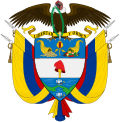| This article is part of a series on the |
| Politics of Colombia |
|---|
 |
Parliamentary elections were held in Colombia on 20 March 1960 to elect the Chamber of Representatives. [1] Under the National Front agreement, only the Conservative Party and the Liberal Party were able to contest the elections, with 50% of the seats in both houses allocated to each party. [2] As a result, the main contest at the elections was between factions within each party. [2]